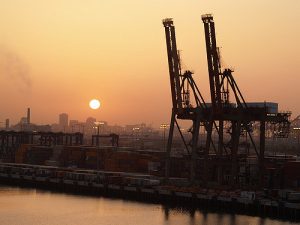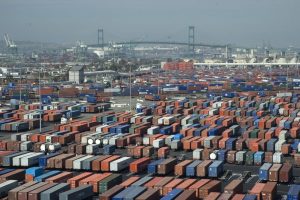Could Trouble Be Brewing with Dockworkers at West Coast Ports?
 There’s a rule in journalism that says don’t bury the lead, so I’ll just say it before giving the background on this story:
There’s a rule in journalism that says don’t bury the lead, so I’ll just say it before giving the background on this story:
There’s tension building with the dockworkers at West Coast ports.
Contentious Dockworker Contract Negotiations Hurt Shippers
What do we want? Stability at the ports! When do we want it? Forever!
That could be the rallying cheer of U.S. shippers, especially after all the disruption at the ports in 2014 and ’15 during the contentious contract negotiations between the International Longshore & Warehouse Union (ILWU) and the Pacific Maritime Association (PMA) that left agricultural exports rotting on the docks and kept import goods from reaching retail shelves in time for the holiday season.
It seemed that every single time an expiration date would approach and hit for a dockworkers master contract at the ports, shippers would have to pay a price through costly delays from slowdowns, lockouts, and/or strikes at the ports.
But then a miracle happened. At least what seemed like a miracle.
Current Contract Situation Between Longshoremen Unions and the Ports
The ILWU went against longstanding dockworker union policy and signed an early contract extension in 2017 that goes all the way to 2022. That put pressure on the East and Gulf Coast ports and dockworkers to follow suit, which the United States Maritime Alliance (USMX) and International Longshoremen’s Association (ILA) did last year with agreement on a new 6-year master contract before the contract they were on expired.
Suddenly, shippers were breathing easier, feeling there was more stability in the relationships between the employers and dockworkers unions at U.S. ports than ever before. But now headlines like the following from Peter Tirschwell at the Journal of Commerce (JOC) hit:
Automation Plans Expose Rising ILWU Tensions
Tirschwell wrote in the JOC article:
… dockworker efforts in recent weeks to overturn Los Angeles port approval of an APM Terminals plan to introduce automated container-handling equipment in a section of Pier 400 devoted to reefer containers suggests labor relations may be entering a new period of uncertainty.
The issue has exposed tensions between labor and management on the West Coast and has opened a new chapter in the rivalry between the ILWU and East and Gulf Coast dockworkers represented by the International Longshoremen’s Association (ILA).
Tirschwell’s article is a great read, highlighting the ways the ILWU is fighting against APM Terminals’ port automation despite the dockworkers master contract allowing automation and barring the union from fighting it, West Coast ports’ market share dropping from 57% to 48% since 2005 because of labor disruption, the need for automation to help pay for the cost of the 2017 Clean Air Action Plan’s mandate for terminals to operate zero-emission equipment by 2030, and ILA’s promise to show its longshoremen’s work would be “far better than any robot or equipment would” be at productivity with New York-New Jersey dockworkers starting a new gang system to achieve a minimum of 30 crane moves per hour.
Trouble Rising from Dockworker Unions Over Automation
 Yes, that’s a lot. But the most important takeaway is that trouble is brewing at the ports.
Yes, that’s a lot. But the most important takeaway is that trouble is brewing at the ports.
Right now, tensions from the ILWU could be well on their way to causing disruption at West Coast ports, and the country’s busiest ports by capacity, the Ports of Los Angeles and Long Beach, in particular.
When it comes down to it, automation is the most contentious issue between dockworkers and employers at the ports. That makes sense as automation is the biggest threat to dockworkers’ jobs.
The West Coast master contract grants the PMA more rights in automating terminals than the East and Gulf Coast master contract grants the USMX. However, none of the ports are without rights when it comes to automation. And automation seems inevitable at the ports, no matter what coast they’re on.
One thing can be guaranteed. Coming automation at ports will meet resistance from longshoremen and their unions. That’s enough to cause worry for shippers. As the sad story of the Port of Portland proved, contracts are not a guarantee against the unions flexing their power in a very costly way for the other members of the supply chain.




